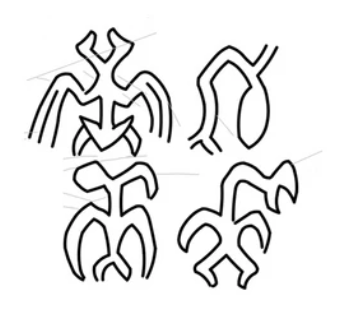The textbook racket industry
SMBC dramatizes an all-too-common dynamic in the textbook industry. The initial negotiation:
Read the rest of this entry »
SMBC dramatizes an all-too-common dynamic in the textbook industry. The initial negotiation:
Read the rest of this entry »
In "At the rind of the debate" we noted an odd use of the word exegesis in the Charlatan Magazine: "the foreign-born population has grown by 4.5 million under Biden's exegesis". Readers diagnosed this as a malapropism for aegis, and another example from a more recent issue of the same publication ("Nightingale", 3/17/2024) confirms the analysis:
While a woman's role within the home was written into the original 1937 constitution under the exegesis of the Catholic Church in Ireland, 2015's Gender Recognition Act and Marriage Act has re-imagined these roles within the once traditional home.
Read the rest of this entry »
"The complex environmental toll of Artificial Intelligence:
AI is very much mostly not green technology"
Devika Rao, The Week US (21 March 2024)
I do not mean to be an alarmist or a negativist, but this is something that people are talking / concerned about, so we should take a look at it too.
Read the rest of this entry »
This is what the device looks like and how it is made:

Jun Chen Lab/UCLA
The two components — and five layers — of the device allow it to turn muscle
movement into electrical signals which, with the help of machine learning,
are ultimately converted into speech signals and audible vocal expression.
Read the rest of this entry »
Below is a guest post by Kyle Gorman and Richard Sproat:
 Ferrara et al. [1] report on the results of a study of several specimens of kohau rongorongo, the enigmatic, undeciphered texts of Easter Island (also known as Rapa Nui). These texts, inscribed on wood—mostly driftwood that washed ashore on the island—may have numbered in the hundreds during the mid 19th century, when the system is known to have been in use. Roughly two dozen inscribed artifacts survive today. Ferrara et al. claim, on the basis of carbon dating, that one of them was inscribed before European contact in the 18th century, and thus represent “one of the few independent inventions of writing in human history”.
Ferrara et al. [1] report on the results of a study of several specimens of kohau rongorongo, the enigmatic, undeciphered texts of Easter Island (also known as Rapa Nui). These texts, inscribed on wood—mostly driftwood that washed ashore on the island—may have numbered in the hundreds during the mid 19th century, when the system is known to have been in use. Roughly two dozen inscribed artifacts survive today. Ferrara et al. claim, on the basis of carbon dating, that one of them was inscribed before European contact in the 18th century, and thus represent “one of the few independent inventions of writing in human history”.
Naturally it is this latter point in particular that has attracted attention in the popular science press. See for example here, here, here and here. So, while the actual results of the paper are quite modest in that they establish the dates of one piece of wood that ended up being carved with glyphs, the authors clearly intend a much more sweeping interpretation of these results. And true to form, the popular science press is happy to help spread a story that, in the words of one of the articles linked above, “could rewrite history as we know it”.
Read the rest of this entry »
Coming soon. https://t.co/mHuBzXyGrx pic.twitter.com/V2dTUkbAWt
— Jeffrey Kotyk (@JeffreyKotyk) March 20, 2024
Read the rest of this entry »
Swedish Collegium for Advanced Study (SCAS)
Symposium on April 11, 2024
Registration by 4th April at the latest
11 April, 11:15 a.m. SYMPOSIUM
Indo-European Food: Linguistic, Archaeological and Biomolecular Perspectives
ABSTRACT:
The symposium Indo-European Food – Linguistic, Archaeological, and Biomolecular Perspectives aims to explore the intricate relationships between the spread of Indo-European languages, the archaeological evidence of food production and consumption patterns, and biomolecular insights into ancient diets. This interdisciplinary event brings together leading experts from linguistics, archaeology, and biomolecular sciences to discuss the latest research findings and theoretical frameworks that illuminate the role of food in the migration, settlement, and cultural integration of Indo-European populations.
Read the rest of this entry »
Preface
Because surnames of immigrants in a melting pot like America often end up getting distorted, bowdlerized, prettified, and otherwise transformed from what they were in their original homelands, we cannot take their current form as gospel linguistic truth. Nonetheless, people who encounter them cannot avoid taking them at their face value, which may cause much merriment or consternation. Here I will list several puzzling, unusual surnames I have known, but will not make an assiduous effort to arrive at a definitive explanation of their etymology, morphology, or phonology
In grade school, there was a classmate with the surname "Hassapis". We all assumed that it meant something related to Manneken Pis (like, he couldn't wait), which I wrote about recently. After googling around for a few moments, I found that a lot of people from Cyprus have that surname, but couldn't find a hint of its meaning. After still more googling, I found that a variant seems to be "Hasapis", which may be derived from the Greek word "hasapi", meaning "butcher", though I'm not so sure about that. (source) Other, more fanciful, derivations have been proposed, but I am inclined to believe that it does have something to do with the Greek word for "butcher":
Read the rest of this entry »
Sino-Platonic Papers is pleased to announce the publication of its three-hundred-and-forty-first issue:
"On the Origins of the Alphabet: Orion/Osiris in Need of a Head/Seed, the Roots of Writing, the Neolithic Europe Word as Sun/Seed System (NEWS), and a Solution to the Tartaria and Gradeshnista Tablets," by Brian R. Pellar.
http://www.sino-platonic.org/complete/spp341_alphabet_orion_osiris.pdf
Read the rest of this entry »
It seems that ChatGPT still has a few things to learn, about conversational dynamics as well as about interlocutor modeling:
@risthinks ChatGPT chatting each other about AI ! #AI #ArtificialIntelligence #ChatGPT #TechTalk #FutureTech #Conversations #Innovation ♬ original sound – RisThinks
Forthcoming from De Gruyter, July 14, 2024 (ISBN: 9783111382746):
Vernacular Chinese-Character Manuscripts from East and Southeast Asia, edited by: David Holm.
Volume 40 in the series Studies in Manuscript Cultures
Keywords: Asia; vernacular; ritual; library collections; recitation
Topics: Asian Literature; Asian and Pacific Studies; Dialectology; Linguistics and Semiotics; Literary Studies; Literature of other Nations and Languages; Southeast Asia; Textual Scholarship; Theoretical Frameworks and Disciplines
Read the rest of this entry »
"Water", "water", everywhere — and it's pronounced differently wherever you go.
See the dozen or so US and UK phonetic and phonemic transcriptions and audio clips provided by Wiktionary here. The last of the US audio clips even has the trace of an initial "h", as some people pronounce "wh-" interrogatives.
——————-
From Marc Sarrel
I recently heard about an engraving that is attached to the Europa Clipper spacecraft, to be launched to the moon of Jupiter in October of this year. Europa likely has a large liquid water ocean underneath its shell of water ice. There is more liquid water on Europa than on Earth.
The vault plate features waveforms for the word “water” in 103 spoken languages, plus a symbol that represents the word in American Sign Language. If you scroll down a bit on the page, you can choose one of the languages, see the waveform and hear the spoken word.
I think this is a really compelling way to represent the common link between Earth and Europa.
I agree with Marc.
Read the rest of this entry »
This post is going to delve into one aspect of a recently-published article from the Centers for Disease Contol: DeCuir J, Payne AB, Self WH, et al. Interim Effectiveness of Updated 2023–2024 (Monovalent XBB.1.5) COVID-19 Vaccines Against COVID-19–Associated Emergency Department and Urgent Care Encounters and Hospitalization Among Immunocompetent Adults Aged ≥18 Years — VISION and IVY Networks, September 2023–January 2024. MMWR Morb Mortal Wkly Rep 2024;73:180–188.
Read the rest of this entry »